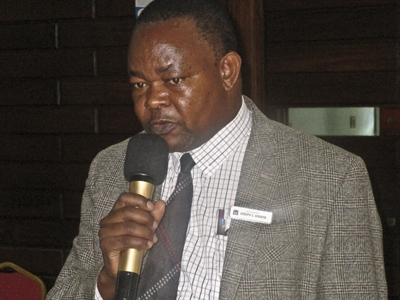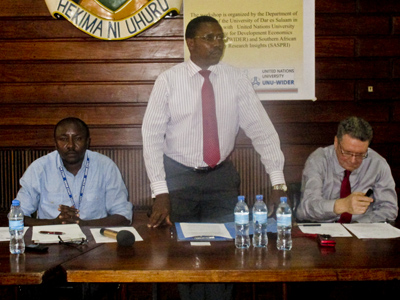News
The role of tax and benefit simulation in informed policy-making - Building TAZMOD for inclusive growth
How can low-income countries like Tanzania use microsimulation modelling to help ensure that economic growth is broad and inclusive? Policy makers, officials, and researchers tackled this question and more at a recent workshop on tax and benefit microsimulation modelling in Dar es Salaam.
Why create a tax and benefit micro-simulation model for Tanzania?
The event — co-organized by the Department of Economics at the University of Dar es Salaam, SASPRI, and UNU-WIDER — is part of ongoing efforts to build Tanzania’s own microsimulation model, TAZMOD. Microsimulation modelling, widely used in developed countries, is an important tool for researchers and policy makers in simulating the impacts of potential reforms in tax and benefits policies on the distribution of income and government expenditure.

However, few developing countries have had access to such models — despite many countries’ current goals to build up social protection systems and the proven usefulness of microsimulation models in doing so. Using these tools, user-defined tax and benefit policy rules can be applied to micro-data on individuals and households to calculate their effects on household income. Policy makers and researchers can then compare what policies mean, in concrete terms, for poverty, inequality, and government revenues.
Bringing policy makers, government officials, and researchers to the table
The workshop provided a forum for policy makers and government officials to discuss ways to develop the country-specific tax-benefit microsimulation model, as well as how it can be used on an everyday basis for the government’s planning and assessment of new tax and benefit arrangements. The diverse group of participants included Joseph Kiraiya from the Prime Minister’s Office, Godbertha Kiyondo from Mzumbe University, and Gemma Wright from SASPRI.

Department of Economics
The group saw significant potential in TAZMOD — especially in light of current efforts by the Tanzanian government to translate economic growth into poverty reduction and increased personal wellbeing. Jehovanes Aikael, Head of the Department of Economics, University of Dar es Salaam, expressed appreciation for both the support and initiatives taken by UNU-WIDER and SASPRI to help create a tax-benefit microsimulation model for Tanzania. As a result of the event, attention is being paid to further engaging government officials in the project, especially those dealing with policy.
Experience shows models can play crucial role in policy-making
In the SOUTHMOD project, led by UNU-WIDER, tax-benefit microsimulation models are being built and further developed for seven African countries — Ethiopia, Ghana, Mozambique, Namibia, South Africa, Tanzania, Zambia — and for Ecuador and Vietnam. These models are built using the EUROMOD platform. Experiences from the development of these other models show that microsimulation modelling can be instrumental in the policy formulation process. In particular it allows social protection, which has been in recent years a key policy strategy against poverty and vulnerability, and different tax systems to be considered and carefully weighed.
 Join the network
Join the network